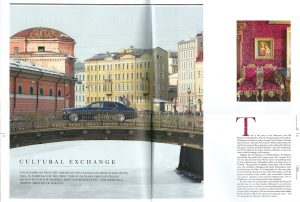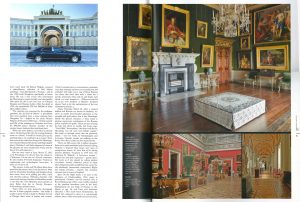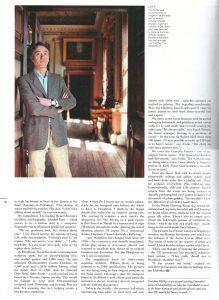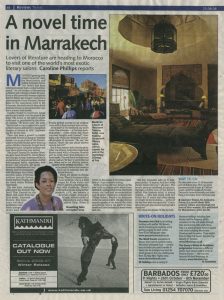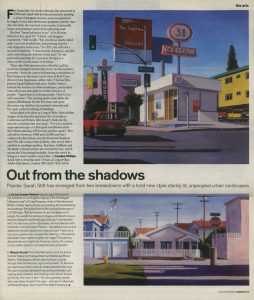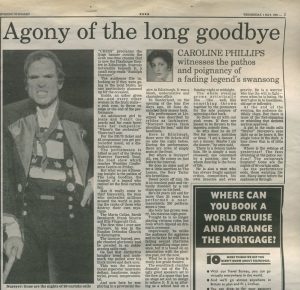“Chess” proclaims the huge banner outside the drab one-time cinema that is now the Playhouse theatre in Edinburgh. Scarsely noticeable beneath it, a small strip reads “Rudolph Nureyev”.
The audience file in, looking as if they were going to the local bistro, no-one particularly glammed up for the occasion.
Inside, an usher gives me – and every other woman in the front stalls – a pink rose, to throw on stage at the end of the performance.
‘CHESS’ proclaims the huge banner outside the drab one-time cinema that is now the Playhouse theatre in Edinburgh. Scarcely noticeable beneath it, a small strip reads ‘Rudolph Nureyev’.
The audience file in, looking as if they were going to the local bistro, no one particularly glammed up for the occasion.
Inside, an usher gives me-and every other woman in the front stalls-a pink rose, to throw on stage at the end of the performance. An adolescent girl in jeans and T-shirt (no pearls and fur coats here) asks her companion: ‘Where’s the orchestra?’ There isn’t one. For the £30.75 ticket and £6 programme you get pre-recorded music, on a diabolical system. The performance is billed as part of the 16-stop Nureyev Farewell Tour, the road show which reaches Wembley Conference Centre on Friday. But what we are witnessing tonight is the pathos of The Long Goodbye, the tragedy of a legend who cannot let the final curtain fall.
Has it really come to this? Inexorably, the man who enthralled millions around the world is joining the ranks of those who destroy their own mystique. The Maria Callas, Sarah Bernhardt, Frank Sinatra and Ella Fitzgerald Club.
The first time I ever saw Nureyev, he was in the Russian Orthodox Church in Kensington. The incense burned, people chanted gloriously and he paraded in an ankle-grazing sable coat. He had that distinctive haughty tread and trademark cap pulled over his thick brows and dark eyes.
This was the international superstar incarnate; defiant, handsome, magisterial, proud, temperamental. And now here he was playing in a provincial theatre in Edinburgh. It was a bleak, undecorative and charmless affair.
In Sunderland, on the opening of the tour five days ago, 50 fans demanded their money back. His performance at Liverpool was described by critics as lacklustre. ‘Nureyev leaves them shouting for less,’ said the headlines. Here in Edinburgh, there were 700 tickets still on sale the night before. During the performance, there are rows of empty seats at the front. But where is Nureyev? Ah, yes. He comes on just before the interval. He does no solos and after a little exertion in The Lesson, the fiery Tartar sits breathless. Sweat pours off him. He is in constant pain and virtually disabled by a calcium spur on his heel. He’s 53 years old and for more than 20 years has performed a near-masochistic 250 performances a year. His body has grown weary, his stamina nigh gone.
Tonight he is no longer playing virtuoso roles, but ones which depend on dramatic presence. Imperiously, he milks the audience for applause and to be fair he still has a fading sexual charisma and compelling stage presence, but it is based on an association with the glorious past, not the now. What he is now doing is really low grade theatre. The soundtrack crackles dismally out of the PA, ugly great speakers set to the fore of a space that has no stage set and no design to relieve it. It is as alluring as a school hall on a Sunday night at midnight. The whole evening grows artistically like . . . like . . . well, like something thrown together by the promoters for the sole purpose of spinning a fast buck.
So there we sit with our pink roses. If they are meant to be thrown to the maestro, nobody does.
So why does he do it? Not for money, ambition or fame. ‘I am a dancer. I am a dancer. Maybe I am the dancer,’ he once said. There is a demon inside him. He is simply a man obsessed; one consumed by a passion; one for whom dancing is the focus of life.
He is also a man who has always fought against critics, competitors, his own muscles and even gravity. He is a warrior who has the will to fight-even when he is losing. He won’t give in to loneliness, old age or infirmity. At the end of the evening, the audience dutifully claps. But there is none of the foot-stamping or whistling that denotes serious approval. A girl in the stalls calls ‘Bravo!’ Nureyev’s eyes light up as he hears it, the single voice in the dark. A lone cheer that is of little cheer. Where is the retinue of yesteryear? The fans straining at the police cordons? The autograph hunters? Gone are the nights of 89 curtain calls. As the performance ends, those watching file out. Many leave before the applause is through.
The dancers’ hero bids farewell DANCERS lost their most formidable champion last night when Wayne Eagling gave his final performance for the Royal Ballet at Covent Garden. Flowers cascaded from the balcony, and bouquets materialised from both sides of the stage, as he blew a departing kiss to the cheering audience and turned to snap the assembled company behind him for his family album. His talents as dancer, choreographer and fighter for dancers’ rights were generously acknowledged by Mr Jeremy Isaacs, the general director of the Royal Opera House, who found him a testing adversary during the dancers’ strike in 1989.
‘He steadfastly championed the cause of dancers in debate and dispute with management,’ said Mr Isaacs.
‘He has fought hard for them and in spite of the spats and recriminations, he is widely respected for his experience, flair and powers of leadership.’
As a dancer, Mr Isaacs continued, Eagling ‘had a formidable technique, a handsome presence, and masculine vitality. He played every prince that ever was’.
For Eagling, who moves to Amsterdam in August to take up directorship of the Dutch National Ballet, his farewell was not an occasion to rake over old coals. ‘I told my mother that I would not say anything controversial,’ he joked.
He said: ‘I have a very warm place in my heart for this building and this House. I hope it remains one of the best in the world-along with the Dutch National.
‘After 25 years with the Royal Ballet-22 with the company and three in the school, which I hated-I’ve a lot of memories. I will miss everyone that’s around.’
He paid tribute to a long list of inspirational dancers-Rudolf Nureyev and Royal Ballet Director Anthony Dowell among them-and to choreographers like Kenneth MacMillan and Frederick Ashton.
* THE BBC is joining with the Royal Opera House, the Kirov Theatre, the Opera de Bastille and other organisations to show a new production of Prokofiev’s War and Peace by British producer Graham Vick at the Kirov this summer. Viewers will be able to see the production, which marks the centenary of the composer’s birth, relayed live from Leningrad on 14 July.


